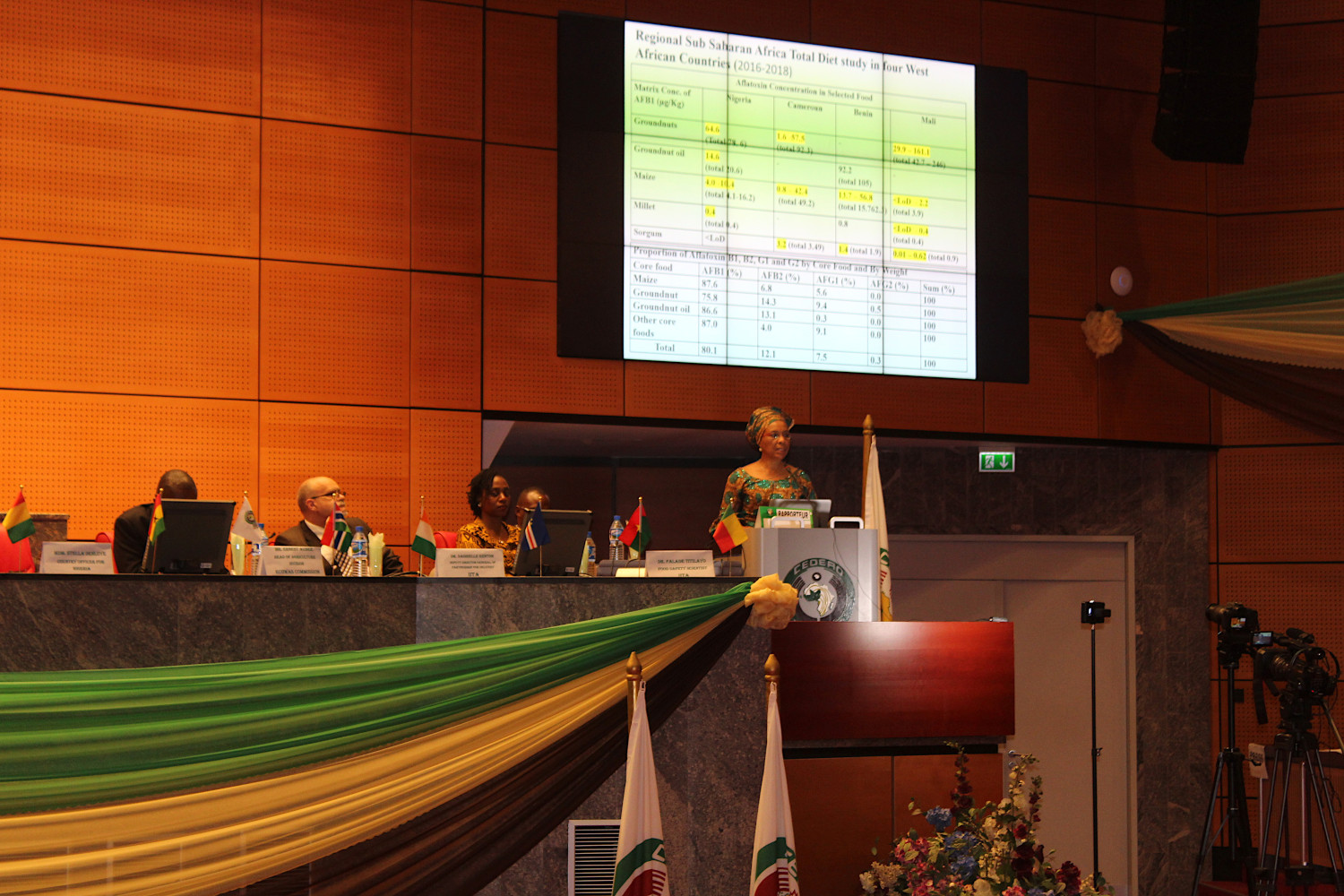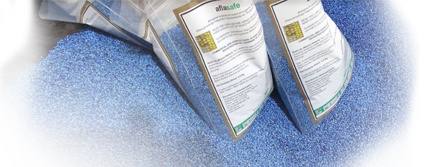Hidden deadly danger – more than 40% of food commodities in our local markets exceed maximum aflatoxin limits, including staples like groundnuts and maize; USD 600m lost in export opportunities
Abuja, Nigeria, 9th December 2019 – The fight against aflatoxin in West Africa’s food went a notch higher at regional level, with the Parliament of the 15-country Economic Community of West African States (ECOWAS) holding a special session on 2nd December 2019 in Abuja, Nigeria, dedicated to aflatoxin.
At hand to present the facts and figures were experts from the ECOWAS Commission, the African Union’s Partnership for Aflatoxin Control in Africa (PACA) and the International Institute of Tropical Agriculture (IITA).

Aflatoxin is a lethal scourge and a silent killer. “You cannot see, smell or taste aflatoxin,” revealed Dr Titilayo Falade, Food Safety Scientist at IITA. Since we all eat food, all are at risk of aflatoxin including the unborn and the youngest, who are also exposed to the poison if the mother eats aflatoxin-contaminated food. And although a worldwide problem, Dr Falade pointed out that aflatoxins are a particularly big problem in the tropics, where Africa squarely sits, hence why Africa as one must rise to the challenge.
Aflatoxin is a naturally occurring poison from toxic types of the Aspergillus flavus fungus. This natural poison can enter our food at any point from the plot before harvest, to the plates at our family tables. Groundnuts, maize, sorghum, cotton-seed, chili and millet are amongst some of the foods prone to aflatoxin, with groundnuts and maize particularly vulnerable. Animals are also affected if feed is laced with aflatoxin, and they then transmit the poison to humans through their products, be this meat, milk or eggs.
“Aflatoxin affects almost all the body’s internal organs,” observed Dr Chris Isiokpunwu, Head of Nutrition, Federal Ministry of Health, Nigeria. “It can affect the heart, lungs, kidneys, liver and intestines. Aflatoxin leads to child stunting, weakened immunity – meaning it depresses the body’s capacity to resist illnesses – and liver cancer, with aflatoxin accounting for 30% of Africa’s liver-cancer cases,” he elaborated.
If consumed in very high levels at one go or within a short period of time, aflatoxin kills, as records from Kenya – and more recently Tanzania – attest. In such cases, children are the highest casualties and the most vulnerable.
But it is not all doom and gloom as aflatoxin can be beaten and controlled with a combination of both pre-harvest, harvest and postharvest measures to keep our food safe from the killer poison. This is through good agricultural practices designed to keep food wholesome and safe from aflatoxin, bolstered by a natural solution, Aflasafe®.
However, there is no single solution, and successfully combatting aflatoxin requires a holistic approach of all the above in concert. More so because aflatoxin continues to be one of the most pervasive and persistent food-safety challenges in Africa, according to PACA.
“Aflatoxin affects public health, trade and the economy, as well as food and nutrition security,” said Ms Stella Denloye, PACA Country Officer, Nigeria. “More than 40% of the commodities in our local market exceed the maximum limits for aflatoxin. PACA studies in West Africa revealed that more than 90% of the groundnuts in The Gambia and Senegal have very high levels of aflatoxins, reaching more than 1,200 parts per billion [ppb], while more than 70% of the maize had very high levels exceeding 1,300 ppb. The allowable limit in the European Union is 4 ppb. Externally, Africa loses more than 600 million dollars annually owing to lost export opportunities.”
Studies at continental level also showed worryingly high aflatoxin levels in cow-milk, breastmilk, blood and urine. Total diet studies in Benin, Cameroon, Nigeria and Mali showed very high aflatoxin content, including for aflatoxin B1, which is the most potent naturally occurring carcinogen known to humankind. More than 80% of the foods tested contained aflatoxin B1.
And yet, there is very little awareness of aflatoxin by consumers and authorities. Most ECOWAS countries hardly have policies or regulations to control aflatoxin, nor do they put into use research findings made available to them, with some countries sceptical about it – or in denial – despite overwhelming empirical evidence on the menace that is aflatoxin, and the toll it exacts on the country’s citizens and economy. This is further aggravated by fragmented and poorly coordinated responses to a complex and pervasive multi-faceted issue. Effective aflatoxin management calls for integration and coordination for a multi-pronged approach to tackle aflatoxin with technology, consumer awareness, and regulations and standards – all undergirded by appropriate policies and institutional frameworks to drive them.
“We need an inter-disciplinary, multi-stakeholder, systemic approach,” said Ms Denloye. “And a mix of pre- and post-harvest measures and good agricultural practices like proper drying and storage, good agricultural inputs such as stress-resistant cultivars and natural interventions like Aflasafe. Market incentives are also needed to stimulate and sustain behaviour change, and stringent aflatoxin-safety regulations must be formulated and rigorously enforced.”
Aflasafe is a natural, fungal, anti-aflatoxin product from IITA that consistently reduces aflatoxin contamination by between 80 and 100%, when used alongside good agricultural practices, and when all the facilitative conditions are met. A homegrown product, Aflasafe is painstakingly customised for each country by drawing from the country’s own native fungi, and working closely with national partners in each country for product development. IITA’s Aflasafe work covers nearly half of ECOWAS: currently, Aflasafe is registered and available in a full one-third of the ECOWAS countries (Burkina Faso, The Gambia, Ghana, Nigeria and Senegal) and at various stages in product development in another two (Benin and Mali). Over the last six years, more than 70,000 farmers in Nigeria have bought and used Aflasafe to protect almost 100,000 hectares of maize, resulting in more than 200,000 tonnes of aflatoxin-safe maize. Starting mid this year, a duly registered private-sector player in Senegal, BAMTAARE, is locally producing Aflasafe SN01 – specially tailored for Senegal and The Gambia – for both countries, under licence by IITA.
In his opening remarks for the aflatoxin session, Dr Kenton Dashiell, IITA Deputy Director General, Partnerships for Delivery, observed that IITA is a fully registered ECOWAS citizen headquartered at Ibadan, Nigeria, since its founding 52 years ago in 1967 through a decree by the then President, Gen Yakubu Gowon. “IITA is a member of the CGIAR global network on international agricultural research, but our focus is 100% Africa, and transforming Africa’s agriculture is our mandate,” he re-affirmed. “For this reason, we’re here today to present our thoughts and ideas on how to control this terrible poison, and also to listen.”
PACA was launched in 2012 to support member states of the African Union and regional economic commissions such as ECOWAS to deal with the complexity of the aflatoxin problem in food – a transboundary issue calling for collective action by all nations if we’re to win the fight against aflatoxin.
To this end, with PACA’s assistance, the ECOWAS Commission formulated a 10-year (2014–2024) regional Aflatoxin Control Action Plan for ECOWAS Member States five years ago in 2014. “All member states should in turn support and urgently and actively implement this plan at country level,” urged Mr Ernest Aubee, Head of Agriculture Division, ECOWAS Commission. “Governments must put in money, just as we are putting money in other emergencies,” he emphasised.
As part of implementing its action control plan at regional level, ECOWAS has signed a Memorandum of Understanding (MoU) with IITA. As a result, ECOWAS has been closely involved in the laboratory- and field-testing of Aflasafe at IITA headquarters in Ibadan, Nigeria, and in ECOWAS member countries. “There is empirical evidence in all these countries and other parts of Africa where Aflasafe research has taken place that it is a safe technology. It is very farmer-friendly and can be used by farmers in our countries without any serious hazards once you stick to the recommended dosage for your fields and follow manufacturer’s instructions,” added Mr Aubee. “Aflasafe has moved from research and innovation to commercialisation through IITA’s Aflasafe Technology Transfer and Commercialisation imitative – ATTC – to help promote Aflasafe at commercial level, so that many more farmers can have access to Aflasafe at an affordable cost. I can say with all certainty that Aflasafe is a big contribution to the advancement of food security and food safety in West Africa and the African region.”
PACA has been called upon to assist in the African Food Safety Index for the African Union’s Biennial Review and its African Agricultural Transformation Scorecard, which were both established in 2018.
And although the tropics face a particularly higher risk owing to a host of interacting factors, food safety is however a global concern, and the first UN World Food Safety Day was observed in 2019.
The interactive session began with a video on ECOWAS efforts in aflatoxin control, a special cut from our longer documentary Food-safety solutions to fight aflatoxin in Africa’s food. ECOWAS members of parliament then posed many questions on aflatoxin and its mitigation, including Aflasafe.
LINKS
- Video: ECOWAS efforts in aflatoxin control
- Aflasafe | aflatoxin | Aflasafe in my country of interest | Aflasafe commercialisation
About IITA: The International Institute of Tropical Agriculture (IITA) is a not-for-profit institution that generates agricultural innovations to meet Africa’s most pressing challenges of hunger, malnutrition, poverty and natural resource degradation. Working with various partners across sub-Saharan Africa, we improve livelihoods, enhance food and nutrition security, increase employment, and preserve natural resource integrity. IITA is a member of CGIAR, a global agriculture research partnership for a food-secure future.
Media contacts:
- Njeri Okono, Communications Specialist, Aflasafe Technology Transfer and Commercialisation initiative (ATTC), IITA
- Ibrahim Gariba, Senior Communication Officer, African Union’s Partnership for Aflatoxin Control in Africa
- Zainab Ogaji, ECOWAS Parliament communications










